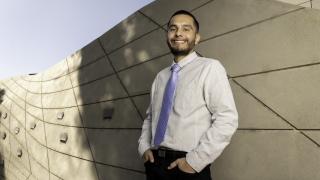Jason Diaz knew something wasn’t right. He was troubled by serious gastrointestinal issues, acid reflux and pain, symptoms that led his doctor to a diagnosis of gastroesophageal reflux disease, or GERD, a common affliction that’s often treated with medication. But Diaz suspected it might be something more serious.
How Diaz Knew He Had Stomach Cancer
Diaz's symptoms were persistent, even after several months of taking his prescribed medicine, so he did some research on his own and came to believe it wasn’t GERD but cancer. His aunt had died of stomach cancer (also called gastric cancer), and that was a huge red flag for him.
“I was diagnosed with GERD in September 2017 and I was given medication that was supposed to eliminate my symptoms,” he said. “Six months went by. They never really went away. I started to research my symptoms in depth and I came to believe that I had cancer, either stomach or colon.”
He was still suffering, so he decided to become a strong advocate for himself. Diaz made another appointment to discuss his concerns and share his research and family history, but his physician stuck with the original diagnosis. For one thing, at just 30 years old, he seemed far too young to get the dreaded disease.
“When I saw my doctor, I told him I thought I had cancer. He told me I was crazy — I was only 32,” Diaz said. “I went over my symptoms, and he suggested I had H. pylori infection. He wrote me a referral to have a stool test done, but I knew in my heart it was more than that. So I lied and told him I had blood in my stool, which is a more advanced symptom.”
This concerned the doctor, so he sent Diaz to a GI specialist who performed an endoscopy that confirmed Diaz’s worst fears — he had Stage 2 diffused signet ring cell gastric cancer.
Ever diligent, Diaz did more research and decided on his next best step on the road to recovery. He made an appointment at City of Hope® and soon found himself enrolled in a leading-edge clinical trial.
Personalized Stomach Cancer Treatment
Diaz chose City of Hope for stomach cancer treatment because he wanted to be treated at the best available local option, a world-class cancer center. Nurses at another hospital had great things to say about it, and he read glowing patient testimonials online that convinced him it was the right choice.
“My experience has exceeded all my expectations,” he said. “My oncologist, clinical trial nurse and surgeon have been my biggest supporters. My surgeon has given me so much hope by her words of encouragement. From the moment I walk in to the moment I walk out, every member of the staff smiles and says hello and goodbye.”
Diaz is nearly finished with his regimen, a combination of chemotherapy and immunotherapy, including the humanized antibody Keytruda. The treatments have been quite effective, and his prognosis is good.
Stomach Cancer in Young Adults
Many people Diaz’s age might dismiss or ignore such symptoms as heartburn or acid reflux, at least at first. But recent statistics show a troubling rise in cases of stomach cancer among young people, even though incidences among the general population have fallen for decades.
Among Americans under 50, the rate increased 1.3% per year from 1995 to 2003, according to the Journal of the National Cancer Institute, while incidence rates fell by 2.6% each year for those over 50.
The findings are alarming and the causes not obvious, but Diaz’s research has led him to believe that “environmental impact” is a factor.
“In Los Angeles we have more cases of stomach cancer than some other areas of the country,” he said. “We are seeing a link between H. pylori bacteria and stomach cancer. We are also noticing a link in young military personnel.”
As with other cancers, early detection is key to successful treatment, but the U.S. is lagging far behind other countries. For example, in Japan the five-year survival rate for stomach cancer is over 60%; in the U.S., it’s around 33%.
“That’s due to endoscopy procedures being done at ages 35 and above in Japan,” Diaz said. “In the U.S., in most cases, endoscopy isn’t offered to young people and we are told it’s GERD.”
Diaz’s experience shows that a proactive approach is essential for young people to get an early diagnosis and successful outcome. In his case, he and his wife — who had a preemptive double mastectomy due to an elevated genetic risk of breast cancer — are planning on having their first child soon.
“Before I started treatment, I had my sperm frozen, and we are now in beginning stages of in vitro,” he said. “It’s an exciting time right now.”
